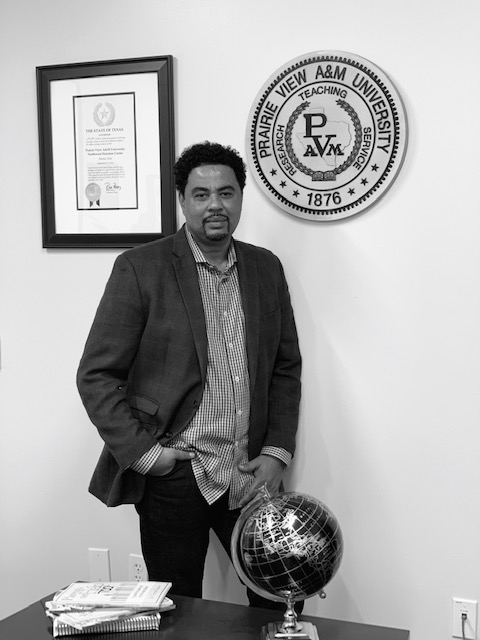NWHC Executive Director Professor Tyrone Tanner Named as Texas Education Agency Conference Keynote Speaker
Dr. Tanner’s work may take him all over the world, but his mission stays close to home: working to ensure all Texans have access to a quality education, regardless of their zip code.
While his focus is centered on addressing inequities in the U.S. school system, he has spoken about his research in more than 20 countries. Just this year, he’s shared his Culturally Responsive message in Canada, Australia, and Ireland.
“A rising tide lifts all ships,” he frequently says of his National Science Foundation funded research. His efforts are already making a positive impact, which is why Texas Education Agency requested his presence as their keynote speaker for the state conference. At the TEA’s Student Success Institute conference, Tanner will be highlighting his work on developing culturally responsive leadership and other proven research based practices that create environments in which all children thrive, including those who have historically been marginalized.
“In my opinion, the United States was founded on a premise which required the nation to see Black and Brown people through a deficit lens. Unfortunately, still today, the least prepared teachers are often placed in schools with a majority of Black and Brown students.” he said, “In many regards, as a system, we’re still segregated.”
Shifting Perspectives
As the keynote speaker for the TEA Conference, Dr. Tanner will have an opportunity to share his work directly with the educators and administrators impacting students across the state of Texas. But he won’t just be sending conference attendees home with innovative ideas and research — TEA has also purchased each participant a copy of his book, Culturally Responsive Theories: A practical guide with case studies for improving the academic performance of diverse learners. The book explores the sources of inequity within the current education system, along with proposals on how to rectify the issue. Rather than focusing exclusively on theoretical situations, the book outlines real world strategies for implementing culturally responsive teaching in the modern classroom. With a background that includes extensive K-16 teaching experience, Dr. Tanner is well aware of the challenges involved with improving academic outcomes. “As an educational system, we have to get more involved in K-12 as a whole,” he explained, “the turning point for students who drop out usually occurs at the middle school level. Mandatory regulations spelled out in Texas House Bill No. 5 requires all Texas eighth-graders to select a high school curriculum that will determine whether they are “college-ready.”
A Seat at the Table
In order to help increase the number of students meeting this “college-ready” criteria, Dr. Tanner is getting right to work.
After receiving a $350,000 NSF grant in 2018 for his project “Applying Innovative Culturally Responsive Pedagogy for African American Middle School Teachers and Students to Broaden the STEM Pipeline,” he began serving on NSF panels. He described the experience as illuminating, as it helped him to better understand what the National Science Foundation, and similar organizations, are looking for in the projects they choose to fund. “I was one of the few there from an HBCU, and it really opened my eyes to all the little nuances of who ends up getting these major grants,” he said of the experience. “You have to be at the table when policies and practices are being established.” It’s not just NSF’s table that he’s sitting at either — he’s also a board member for the Hearne Education Foundation, which operates similarly to a school board while also interfacing with chambers of commerce. As a board member, he’s in a prime position to help improve access for those that need it the most, and help move everyone to a brighter, more educated future.
Setting the Stage
 Dr. Tanner’s approach is unique in its focus on the students who need the most help, but are often ignored.
Dr. Tanner’s approach is unique in its focus on the students who need the most help, but are often ignored.
“Research shows that Black students often have less access to advanced math and science courses. These are factors in creating a system that leaves Black and Brown students lagging behind their White counterparts, especially in the critical STEM areas. Not because they lack the intellectual capacity, but because of factors associated with deficit model thinking,” he explained.
More culturally aware educators are just one piece of the puzzle, though. To help students truly succeed, parents also need to be involved. To that end, Dr. Tanner will be hosting the NWHC Back to School Summiton August 17, 2019. Here, he’ll share with the Houston community “Best Practices in Parenting; Curriculum Pathways leading to STEM, and Best Practices for healthy home, school, and community partnerships.”
Tanner elaborated that oftentimes, parents are former students that the education system failed a generation ago. “It’s time we removed barriers that keep parents out of the school. We must actively engage and invite parents to be a part of the national conversation about education,” he said. With the combination of his insight and continuous efforts, there’s no doubt that the students of tomorrow will have every chance at success.
Be sure to follow along at @pvamu for the most up to date information on how Prairie View A&M Professors are creating the education systems of tomorrow.
